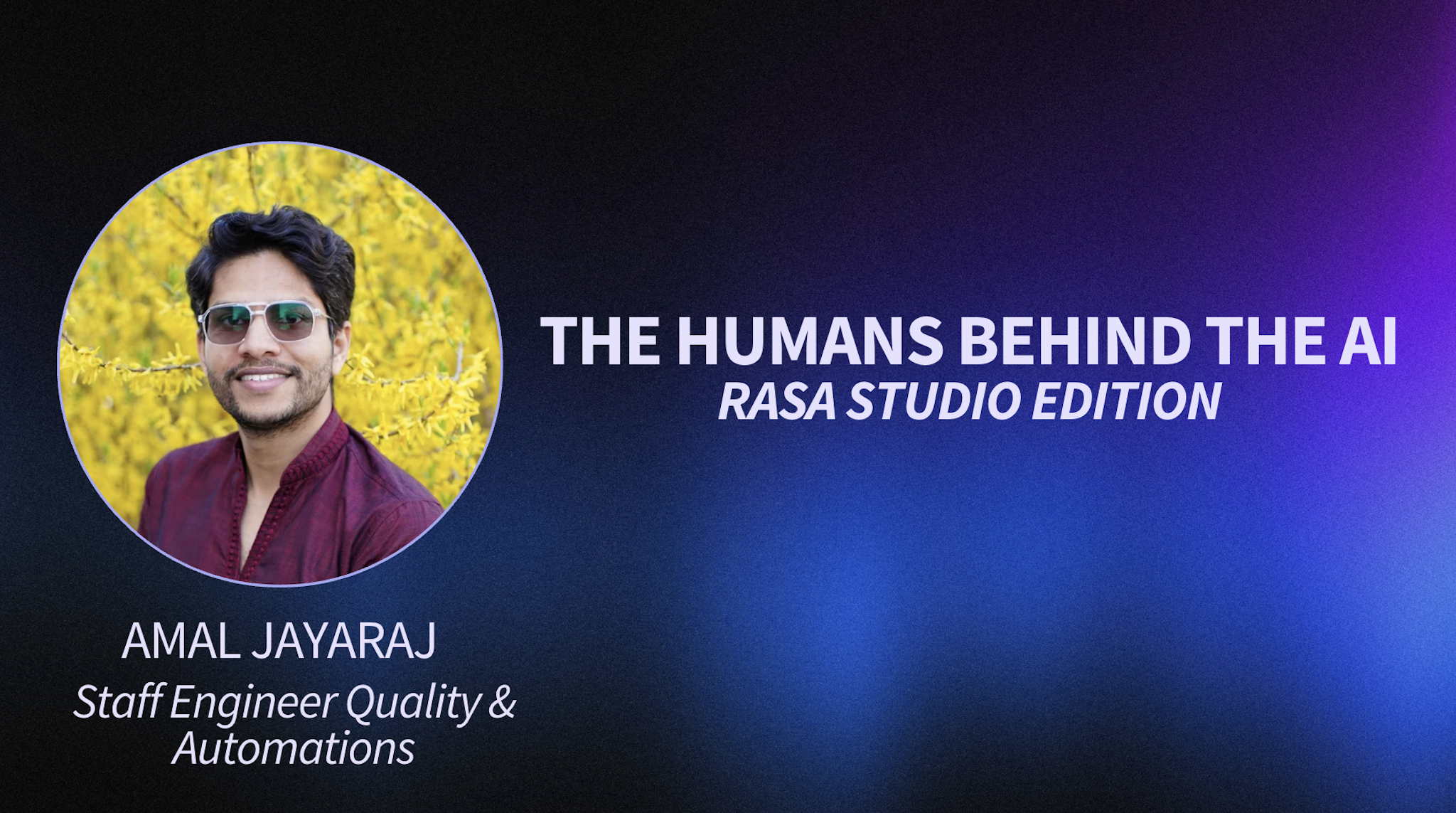April 24th, 2025
The Humans Behind the AI: Amal Jayaraj
Rasa
At Rasa, our team is building the standard infrastructure for conversational AI. Behind the scenes, the people of Rasa come together from diverse backgrounds to solve today’s most interesting challenges in conversational AI. We’re pulling back the curtain to highlight a few of the humans behind the AI.
1. Hi, Amal. Tell us about yourself! What was your path to joining Rasa?
I am currently a Staff Quality and Automation Engineer at Rasa, where I enable teams to implement the right quality engineering practices and automation infrastructure.
My journey to Rasa started with a casual chat with a Rasa HR. They got me interested when they talked about the company's mission, culture, and tech challenges. The interviews that followed really sealed the deal for me. I met skilled and collaborative people excited about their work. By the end of the interviews, I knew Rasa was the perfect place to keep growing as a quality engineer and immerse myself in the AI landscape.
Since joining the Rasa team, I've been working on the next generation of Rasa products. It's been a challenging and rewarding experience, pushing the limits of conversational AI and trying to give our customers the best possible products. I'm thrilled to be part of this energetic and innovative team, and I'm sure that together we'll continue to shape the future of conversational AI!
2. Take us through a typical day on your role. What types of projects do you work on?
I work on the Rasa Studio team, developing the no-code interface for building conversational AI with Rasa. Our goal is to provide an easy-to-use solution to build advanced AI agents that leverages Rasa's CALM (Conversational AI with Language Models) capabilities.
My typical day includes working with the new product features our teams are actively building. I collaborate with the devs and perform exploratory testing on the new features. I work continuously on improving our automated testing tools and managing the internal CI infrastructure for running and testing our application. I also get the opportunity to work directly with our customers, helping them set up their internal Studio infrastructure and resolve any issues they encounter while working with Studio.
3. What's an important problem you're solving at Rasa?
We are creating a better user experience to design complex conversational assistants. Our focus is crafting collaborative workflows that empower both non-technical and pro-code developers to build agents effectively. While non-technical users gain intuitive tools, pro-code developers have the flexibility to implement low-level customizations.
As a quality engineer, I enjoy the challenge of developing automated quality engineering practices that keep pace with our rapid development cycles.
4. How would you describe Rasa in three words?
Innovative, fun, international
6. What’s one thing you wish more users knew about Rasa’s capabilities?
"Prompt & Pray" is not a reliable strategy, especially for high-stakes situations. Rasa offers a dependable method for creating conversational AI assistants that harness the power of LLMs. I hope users won't be blinded by the hype surrounding AI and will remember the importance of maintaining control over their conversational workflows. Rasa's strength lies in giving users the tools they need to ensure their AI agents accurately represent their brand.
7. What’s a feature or innovation you’re particularly excited about in Rasa’s future?
Many things actually. I’m excited about the voice native features that Rasa is working on. Fine tuning custom LLMs is a promising feature our customers would love. Providing a way to mock external custom actions for rapid development in Studio will be a great productivity boost for conversational designers.
8. How do you collaborate with other teams at Rasa?
At Rasa, a remote-first company, collaboration revolves around availability and responsiveness to colleagues. We use Slack to communicate and readily engage in Zoom calls for efficient teamwork. While primarily remote, we recognize the value of personal connection and make a concerted effort to gather with our teams and the entire organization multiple times annually. Our last company offsite was in Porto, Portugal and we had a cooking session where we made “pastel de nata”. We had so much fun and made a tasty treat. I’m proud of that one!
9. What’s the most interesting thing you’ve learned lately?
The potential of AI-assisted coding is immense, and I've been exploring its possibilities. It's already boosting my productivity, and I believe it will significantly change the software industry. It's thrilling to be part of these technological advancements. While "vibe coding" (using AI to generate code from natural language prompts) is useful for small, specific tasks under supervision, I remain cautious about relying on it for production-grade applications.
10. What’s the best career advice you’ve received?
To advance your career, adopt a practical approach centered around continuous learning and skill development. Avoid over-engineering. Sometimes, engineers try to implement complicated solutions because they are "cool" or "trending," but they end up harming the product by introducing overengineered solutions. It is important to keep things simple and pragmatic. One can always try out cool things as a side project, but not on your production code base.
Thanks, Amal!
Want to team up with Rasa? We’re hiring! Find open positions on our Jobs Board.
